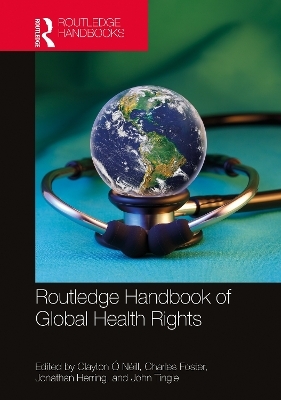
Routledge Handbook of Global Health Rights
Routledge (Verlag)
978-1-032-00460-0 (ISBN)
This book examines the idea of a fundamental entitlement to health and healthcare from a human rights perspective.
The volume is based on a particular conceptual reasoning that balances critical thinking and pragmatism in the context of a universal right to health. Thus, the primary focus of the book is the relationship or contrast between rights-based discourse/jurisprudential arguments and real-life healthcare contexts. The work sets out the constraints that are imposed on a universal right to health by practical realities such as economic hardship in countries, lack of appropriate governance, and lack of support for the implementation of this right through appropriate resource allocation. It queries the degree to which the existence of this legally enshrined right and its application in instruments such as the International Covenant on Economic, Social and Cultural Rights (ICESCR) and the Universal Declaration of Human Rights (UDHR) can be more than an ephemeral aspiration but can, actually, sustain, promote, and instil good practice. It further asks if social reality and the inequalities that present themselves therein impede the implementation of laudable human rights, particularly within marginalised communities and cadres of people. It deliberates on what states and global bodies do, or could do, in practical terms to ensure that such rights are moved beyond the aspirational and become attainable and implementable. Divided into three parts, the first analyses the notion of a universal inalienable right to health(care) from jurisprudential, anthropological, legal, and ethical perspectives. The second part considers the translation of international human rights norms into specific jurisdictional healthcare contexts. With a global perspective it includes countries with very different legal, economic, and social contexts. Finally, the third part summarises the lessons learnt and provides a pathway for future action.
The book will be an invaluable resource for students, academics, and policymakers working in the areas of health law and policy, and international human rights law.
Clayton Ó Néill, LLB (Ulster), LLM (Dub), BCL (Oxon), PhD (Durham), FHEA, is a Lecturer in Law at Queen’s University Belfast, Northern Ireland. He has published a monograph, titled Religion, Medicine and the Law (Routledge 2018). Charles Foster is a Visiting Professor at the University of Oxford, UK, a fellow of Green Templeton College, Oxford, a Senior Research Associate at the Uehiro Institute for Practical Ethics, Oxford, and a Research Associate at the Ethox Centre and the HeLEX Centre at the University of Oxford. Jonathan Herring is the DM Wolfe-Clarendon Fellow in Law at Exeter College, UK, and a Vice Dean and Professor of Law at the University of Oxford, UK. John Tingle is a Lecturer in Law at the University of Birmingham, UK, and a qualified Barrister. His research interests are in the areas of global and English patient safety, nursing law, and universal health coverage. He is a Visiting Professor of Law at Loyola University School of Law in Chicago, Illinois, USA.
Part A
Chapter 1: An introduction to health rights as they apply in a global landscape
Chapter 2: Universal Declaration of Human Rights Part I: Articles 1, 2 3, 5 and 6
Chapter 3: Universal Declaration of Human Rights Part II: Articles 7, 12, 16, 18, 19 and 25
Chapter 4: A global right to health amid global health emergencies
Chapter 5: Global Health Rights in the Inter-American Court of Human Rights:On the Doctrine of the Minimum Core Obligations and a Co-Responsibility to Care
Part B
Beginning of life and children
Chapter 6: Assisted Reproductive Technologies in Uganda: Law and Practice
Chapter 7: Abortion and conscience: a crossroads for Northern Ireland
Chapter 8: The standard of care and implications for paediatric decision-making: the Swedish viewpoint
Middle of Life
Chapter 9: The right to health in Hong King: incorporation, implementation and balancing
Chapter 10: ‘Dignity’ in the adjudication of health rights in India
Chapter 11: Universal health coverage and the right to health in Nigeria
Chapter 12: Realising the right to health in Kenya: connecting health governance outcomes to patient safety perspectives
Chapter 13: Developing an intrinsic patient safety culture in health systems: the NHS experience
Chapter 14: Clinical Negligence Litigation Procedure, Policy and Practice in England: the product of a legal cycle rather than an application of a right to health?
Chapter 15: Patient Safety and Human Rights
Chapter 16: Fundamental rights to health care and charging overseas visitors for NHS treatment: Diversity across the the United Kingdom’s devolved jurisdictions
Chapter 17: Public reporting, transparency and patient autonomy in the province of Quebec
End-of-life
Chapter 18: Human tissue, human rights and humanity
Chapter 19: Autonomy and the right to (end one’s?) life: a German perspective
Chapter 20: End of Life Issues in Australia and New Zealand
Chapter 21: Comparative perspectives on medical aid in dying: the United States and Canada
Part C
Chapter 22: A right to health: a right granted, agreed, but limited or denied?
| Erscheinungsdatum | 22.12.2022 |
|---|---|
| Verlagsort | London |
| Sprache | englisch |
| Maße | 174 x 246 mm |
| Gewicht | 594 g |
| Themenwelt | Sachbuch/Ratgeber ► Gesundheit / Leben / Psychologie |
| Medizin / Pharmazie ► Gesundheitswesen | |
| Recht / Steuern ► EU / Internationales Recht | |
| Recht / Steuern ► Öffentliches Recht ► Völkerrecht | |
| Recht / Steuern ► Privatrecht / Bürgerliches Recht ► Medizinrecht | |
| Sozialwissenschaften ► Pädagogik ► Sozialpädagogik | |
| Sozialwissenschaften ► Politik / Verwaltung | |
| Sozialwissenschaften ► Soziologie | |
| ISBN-10 | 1-032-00460-6 / 1032004606 |
| ISBN-13 | 978-1-032-00460-0 / 9781032004600 |
| Zustand | Neuware |
| Informationen gemäß Produktsicherheitsverordnung (GPSR) | |
| Haben Sie eine Frage zum Produkt? |
aus dem Bereich


